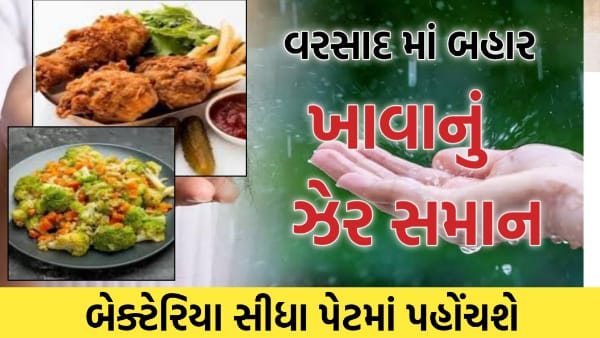Who doesn’t love hot tea, pakoras and samosas amidst the drizzle. But eating pakoras and samosas sold on lorries during the rainy season increases the risk of food poisoning and diarrhoea.
Many spices are added to make them spicy. The oil they are fried in is of poor quality.
The quality of potato or onion available in this season is not good. If it is used in samosas, the risk of food poisoning increases.
Dietician Dr. Vijayashree Prasad says that every second-third person complains of stomach ache, stomach cramps, diarrhea on rainy days. One of the reasons for this is humidity. Due to which the process of metabolism slows down.
That is why food is not digested properly. The enzymes in the stomach are not able to extract all the nutrients from the food.
Panipuri water can also be bad
If you are fond of panipuri, beware. Potatoes prepared during the rainy season spoil quickly. They become sour due to moisture.
Many vendors offer different flavored water with golgappa. This water can also be bad.
The quality of dry spices added to it is also not good. Bacteria can grow in it due to lack of hygiene. Feeding golgappa to children should be avoided during this season.
Eat Jalebi and Idli-Dhonsa carefully
Avoid eating yeast on rainy days. Jalebi on lorry is also not good for health. In fact, food items like jalebi, idli, dosa, bread, dhokla, bhature are fermented foods. That is, flour and rice are first soaked in water for hours and then baking soda, fruit salt are added.
This causes yeast to grow in them. Harmful bacteria can grow in it in the rain. Eating this can cause gastrointestinal diseases.
Do you also eat cut fruits in the market?
You may have seen cut fruits being sold at roadside stalls. Pineapples are mostly sold only on lorries. But these fruits are not good for health.
Cut fruits are left open for hours. Due to which the fruits get contaminated. If such fruits are eaten, stomach upset may occur. Chandigarh Community Health Professor Dr. Sonu Goyal says these lorries are often on the roadside where sewage flows around. Contaminated water can also contaminate nearby food and drink. That is why it is better to cut the fruits and eat them at home.
Contaminated water may be used in the juice
Many people drink fruit or vegetable juice every season. Can drinking juice in rainy season do any harm to health?
Dr. Goyal says that the shopkeepers do not take care of hygiene while extracting the juice. Water is added to juice the carrots and beetroot.
This contaminated water can cause stomach infections. During the rainy season, many people complain of stomach flu or gastroenteritis. This is colloquially called flatulence or flatulence.
Avoid colocasia leaves and spinach
Green leafy vegetables should not be eaten during rainy season. Because of the moisture, tapeworm larvae thrive easily on these leaves. They are so subtle that they cannot be seen by the naked eye.
Dr. Sonu Goyal states that spinach, red greens, cabbage should not be eaten during rainy season. Many times people make pakodas of colocasia leaves. But even these leaves can contain insects. These tapeworms can also occur in capsicum and brinjal.
These insects do not die even after proper cooking. It can also reach the brain, which can kill someone. Eating mushrooms on rainy days should also be avoided.
Avoid eating salads and sprouts
Eat less salad this season. Do not eat cabbage at all in salads. Similarly, sprouts should not be eaten. Moisture can cause bacteria to grow in it. If sprouts are eaten during the rainy season, there is a possibility of food poisoning.
Be careful while ordering food from outside
Working people mostly order food from restaurants or hotels. They don’t know whether hygiene has been taken care of while cooking or not. In such a case, take food only from hotels that guarantee cleanliness. If pickle, papad, chutney is served in the meal, avoid eating it. It has high salt content. There is also fear of mold in pickles and papad due to humid environment.
Use mint, basil and ginger for cold and cough.
Cold and cough are common when we get wet in the rain. Drink mint, basil and ginger herbal tea this season. They have the ability to fight harmful bacteria. Ginger provides relief from throat infections.







